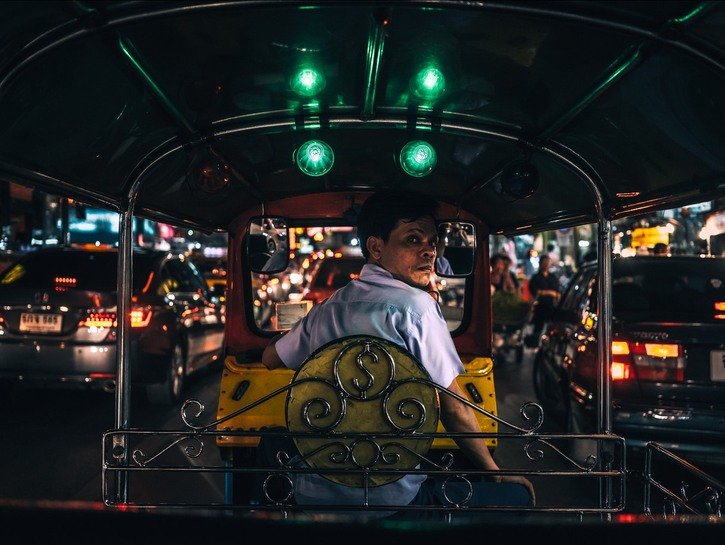
1. Broken Meter In The Taxi
The Uber app is becoming increasingly popular for tourists in other countries, and for good reason! Travelers often report negative experiences with cab drivers. Sometimes it’s just poor service, but something it’s criminal: one of the most common cheats is the broken taxi meter scam.
Videos by TravelAwaits
How it works:
Upon getting into a taxi, usually outside of an airport or train station, the driver will start pulling away while informing you that his meter recently broke. He’ll then go on to charge you a ridiculously high fare that can’t be argued due to the meter being broken. This is especially common in Central America, in places such as Costa Rica.
How to protect yourself:
There are a few different ways to get around this scam. First, try to negotiate the fare before getting in any taxis, or double check that the meter is actually working and turned on. You don’t need to mistrust all taxi drivers, but Uber is another good option in many countries, as the app handles all of the payment automatically, so drivers don’t have the chance to rip you off like this.
2. Phony Police Officers
Police departments are generally supposed to be trusted institutions that tourists can feel comfortable turning to for help. But a recent scam has made it so you even have to scrutinize your dealings with people claiming to be officers of the law. After all: they may not be who they say they are.
How it works:
This scam involves a few people playing different parts. First, someone will approach you and offer you something illegal, such as drugs. When you tell the person “no,” one or two people dressed as police officers will approach to investigate. They might quickly flash some kind of identification or badge, and then they’ll insist that you give them your wallet and passport. The catch, of course, is that they’re not police officers, and you’ve just handed over your most valuable possessions to random conmen.
How to protect yourself:
Evaluate these “police officers” carefully. A big tell is the requests they make i.e. wallet and passport. Always ask for identification and thoroughly inspect it when it has been provided. If you’re still unsure, inform them that you’ll call their police headquarters to confirm their identity as you’ve been made aware of a recent scam. If all that fails, you can tell them that you don’t have your passport as it’s locked up in your hotel safe. Offer to have them accompany you to the hotel. This will likely cause the con artists to give up and choose a victim who doesn’t put up such a fight.

3. Free Gifts
A popular scam in many cities, including such gems such as Lisbon, Paris, and Rome, is to use the allure of a friendly stranger and a free gift. Sadly, it’s caused us to mistrust anyone offering anything free, as it almost always comes with strings attached.
How it works:
While lingering outside a popular tourist destination, you’ll be approached by a friendly stranger. They might casually chat with you for a few moments before trying to force a “free” gift into your hand, onto your wrist, etc. Once you accept the gift, they immediately change their tactic and start demanding money in return. They’ll use guilt, aggression, and a number of other tactics to get you to give them money, sometimes even making a public scene if you refuse.
How to protect yourself:
There’s no such thing as a free lunch, so never let anyone force anything into your hands or onto your body. Ignore these fraudsters and make as little contact as possible when walking past them.
4. The Attraction Is Closed
Naturally, you’ll likely be planning to visit many popular attractions during your travels. Scammers are preying on tourists in these areas and using subtle techniques to con them.
How it works:
When you near your destination, a friendly local might approach you, strike up a conversation, and casually let you know that the attraction you were hoping to visit is closed today for some unspecified reason. They’ll offer you a “helpful” suggestion and mention another shop or attraction to visit instead. Once you get to this destination, you’ll be strong-armed into paying a hefty sum to enter.
How to protect yourself:
If someone tells you the attraction you’re planning to check out is closed, verify it for yourself. Call them, go to the ticket counter, or ask someone else to confirm if it’s true.

5. Guest WiFi Hubs
There’s plenty of free WiFi access throughout the world, which is great. But travelers should be wary when they join a new network. It could be a dangerous source.
How it works:
A savvy scammer will set up an unsecured hotspot in a public area to lure tourists eagerly in search of free WiFi. When you connect, without knowing it, you’ll be handing over access to your computer or phone, account information, passwords etc. Spyware could even be planted to monitor your usage going forward.
How to protect yourself:
If you’re at a cafe, airport, or hotel, ask the staff which connection is the official one so that you avoid copycat hotspots. If you need WiFi, always try to get it from a verified source, and consider installing a virtual private network on your device to encrypt all of your online activity and prevent hackers from taking advantage of it.
You don’t have to avoid the locals or mistrust everyone you meet. But watch out for these common scams, and protect yourself as best you can. Nobody deserves to be taken advantage of.
